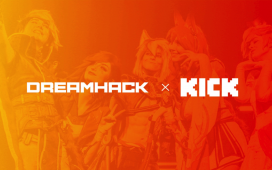Mentioned in this article
League/Tournament Brands:
Last week China reported that 24 provinces had no increase in novel coronavirus outbreak (COVID-19), and most of the Chinese people have gone back to work after the Chinese New Year. Unfortunately, the virus has expanded to Italy, Iran, Japan, and South Korea. Multiple esports companies and esports tournaments in those regions have been affected.
In addition, China’s Ministry of Culture and Tourism issued a travel alert for Chinese citizens to the United States. The government believes that “the U.S government [is] overreacting” to the coronavirus outbreak situation in China. This could create challenges for Chinese Dota 2 teams trying to attend ESL One Los Angeles Major.
During Dreamhack Anaheim 2020, tournament organizer ESL and Back2Warcraft made a cheering video for Chinese fans because not a single Chinese player was able to participate. The video features all Warcraft III players from the event.
Among the top stories: Japan and South Korea have been affected by cases of coronavirus, which influenced the Overwatch League, League of Legends Champions Korea, PUBG Global Series Korea Qualifier, and League of Legends Japan League; Bilibili has denied reports that Tencent is the top shareholder of the company; Honor of Kings team XQ partnered with Chinese chat service TT; and the Beijing government announced plans to host the 2020 Honor of Kings World Cup.
Every week The Esports Observer presents the biggest esports business news in China including investments, acquisitions, sponsorships, and other major news from the region.
Japan and South Korea Coronavirus Cases Influence OWL, LCK, PSG, and LJL

The coronavirus has expanded to Japan and South Korea. At the time of writing, Japan has reported 891 cases, and South Korea has 1,261 cases, according to China’s largest news publication People’s Daily. On Feb. 23, the South Korean government raised its coronavirus alert to the “highest level.”
Those situations have influenced Japan and South Korea’s esports industry. In esports, South Korea has a strong esports identity and well-developed facilities. On Feb. 24, Activision Blizzard announced that it would cancel Weeks 5-7 of the Overwatch League 2020 in South Korea, including Gen.G’s Seoul Dynasty home event. The decision was to protect the health and safety of the players, fans, and staff.
The PUBG Global Series (PGS) Berlin Korea Qualifier has changed to a complete online competition. According to esports publication People Esports, all teams will stay indoors to participate, and if the teams don’t have a place to compete, they will move to AfreecaTV internet bar for the competition. In addition, the organizer will send a referee to each team.
The qualifier will start on Feb. 27 and run until March 14, and the top four teams will qualify for PSG Berlin.
League of Legends Champions Korea (LCK), the top League of Legends tournament in South Korea, as well as a major region in the global League of Legends esports scene, was almost closed due to the coronavirus. On Feb. 23, the LCK host Kim Min-ah was said to have a high fever during the event. LCK organizer Riot Games Korea took this situation seriously and sent her to the hospital to be checked. Fortunately, the host reportedly tested negative for coronavirus. On Feb. 25, Riot Games Korea decided to close the media room, but the tournament will continue. In addition, host Kim Min-ah will not feature on this week’s LCK.
On Feb. 25, Japan’s top League of Legends competition, the League of Legends Japan League (LJL), announced that it will close the competition for the public on March. 1, and will be played without a live audience due to the coronavirus.
Bilibili Denies Tencent as Top Shareholder of the Company

On Feb. 21, as reported by Chinese publication The Paper, Blibili denied reports that Tencent becomes the top shareholder of Chinese video platform Bilibili” by many Chinese and western media outlets.
“Tencent has increased its share of Bilibili since last year, and the share has close to 13.4%,” said Bilibli. “Tencent is still the second shareholder of Bilibli.”
Rui Chen, the CEO of Bilibili, is still the top shareholder of the company, owning 15.1% according to the shareholder report, which Bilibili filed with the U.S. Securities and Exchange Commission on Feb. 13.

The filing also showed that outlets who reported that Tencent increased its share in Bilibili to 18% were incorrect; 18% of shares are Z ordinary shares, not the total stock issue.
Honor of Kings team XQ Partners Chat Service TT, Rebrands to TTG.XQ

On Feb. 17, Chinese Honor of Kings team XQ announced that the organization partnered with Chinese chat service TT, and rebranded to TTG.XQ with a new logo. The logo features a goat with blue, red, and white colors. More details of the deal were not disclosed.
TTG.XQ is an Honor of Kings team that competes in the King Pro League, and it has its own home venue in the Chinese city of Guangzhou. In Chinese culture, Guangzhou is also called 羊城 (English term: The city of goat).
Other Esports Business News:

- On Feb. 23, South Korean esports organization Gen.G selected Chinese NBA 2K player Hu “Luck” Yi to join its NBA 2K team Gen.G Tigers of Shanghai during the NBA 2K League Draft at Round 4, second pick. Hu is the first Chinese player to compete in the NBA 2K League.
- On Feb. 14, Chinese League of Legends player Yu “Jackylove” Wenbo donated ¥80K RMB ($11.4K USD) to Hubei Huanggang hospital. Yu won the 2018 League of Legends World Championships, and was born in Huanggang, part of the Hubei province.
- On Feb. 19, the Beijing Municipality announced the city will host the “Esports Beijing 2020” series of events, including the 2020 Honor of Kings World Champion Cup Grand Final, and QQ Speed National Open Final.













